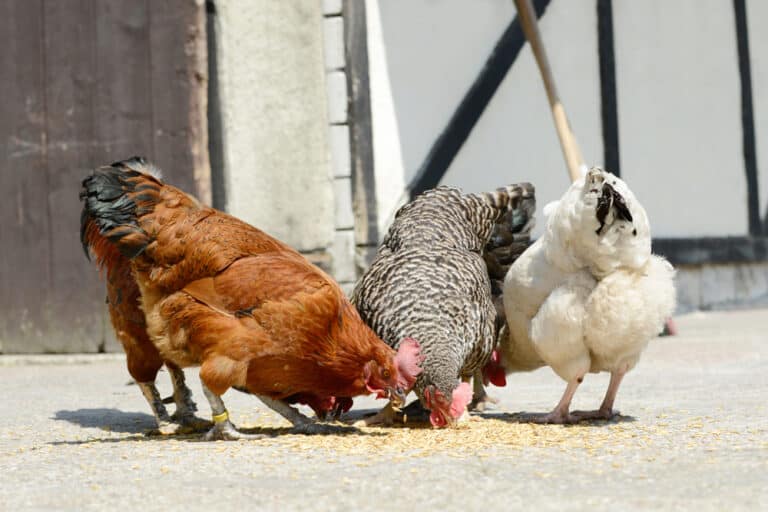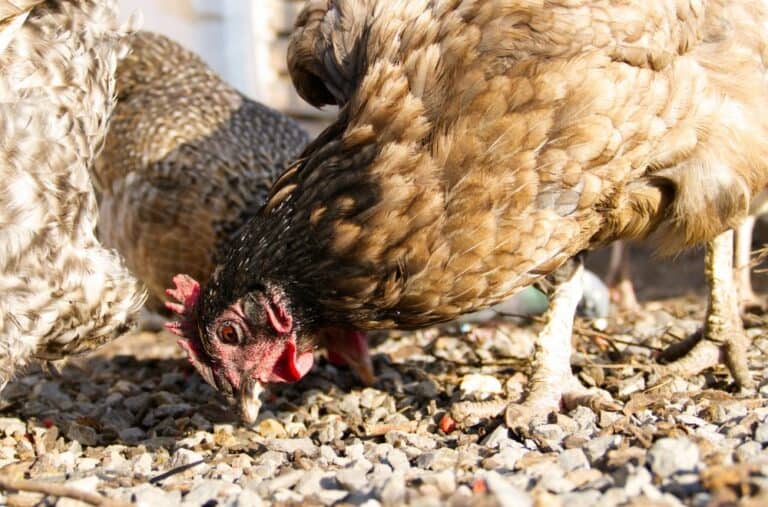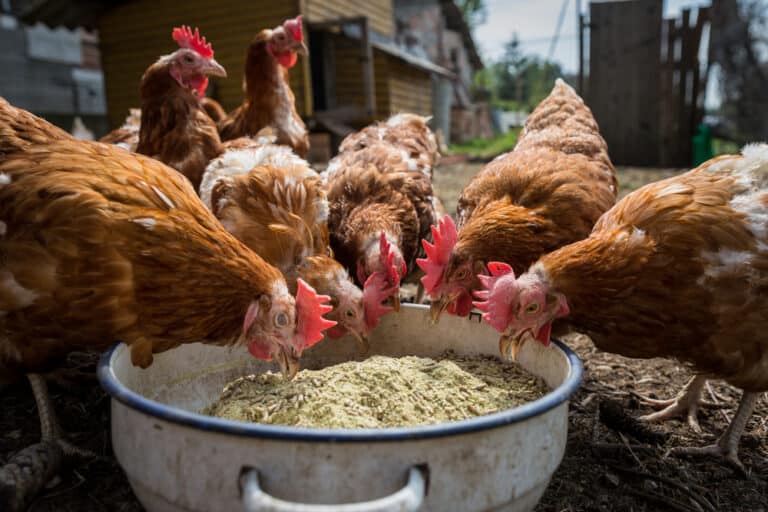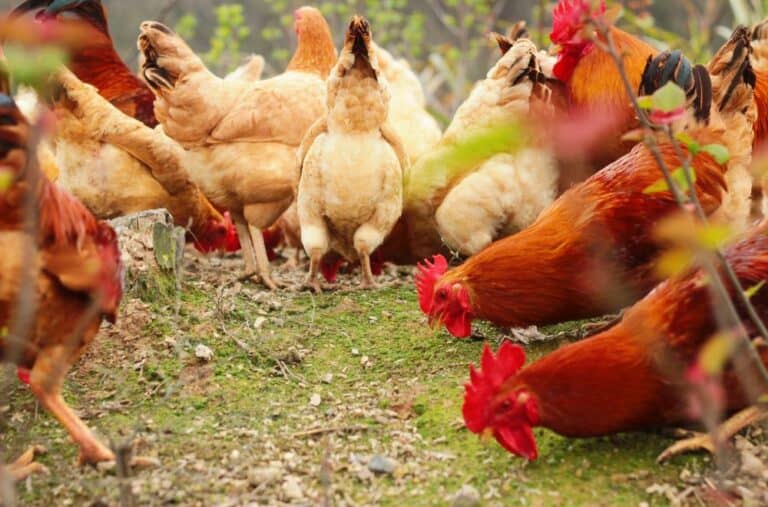All chicken keepers know that some foods make great treats for chickens while others should be strictly avoided – so which category does yogurt belong to?
In fact, yogurt falls somewhere in the middle, and to explain why, in this post, we answer the question, can chickens eat yogurt?
Can Chickens Eat Yogurt? The short answer
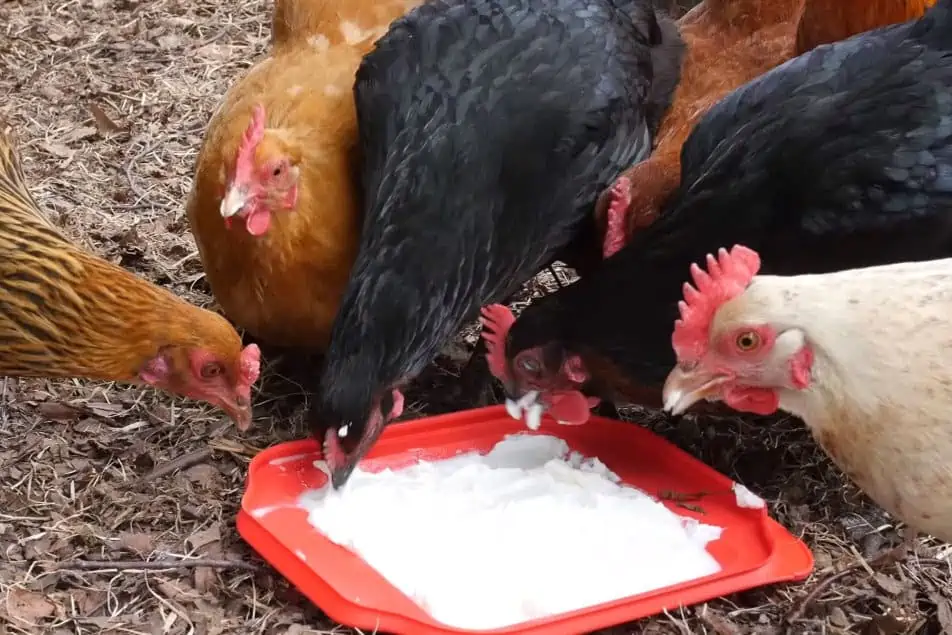
Before we get into the details of what’s a fairly complex discussion, let’s make things as easy as possible by starting with a simple answer.
Can chickens eat yogurt? Yes, they can.
Chickens can eat a little yogurt from time to time without suffering any adverse effects.
However, whether they should eat yogurt is a different question, and to answer it, we’ll need to look at this topic in a bit more detail. So let’s jump right in and do that now.
What is yogurt?
Before we talk about feeding yogurt to chickens, we need to step back and think about what yogurt is – because there are lots of different types of yogurt, and some might be more suitable for chickens than others.
At its most basic, yogurt is a type of food that’s created by fermenting milk. The milk used is usually cow’s milk, but sometimes yogurt is made from the milk of other animals too.
The fermentation process produces lactic acid, which helps give yogurt its naturally sour flavor as well as its thick texture.
Yogurt can be strained or unstrained. When yogurt is strained, the whey is removed, which leaves the remaining yogurt even thicker. In English, this kind of yogurt is usually called “Greek” or “Greek-style” yogurt, although this type of yogurt doesn’t come only from Greece.
Commercial yogurt can also be “pasteurized” or “probiotic”. Pasteurized yogurt is heat-treated to kill off all bacteria. Probiotic, on the other hand, receives the same heat treatment – but then human-specific “helpful” bacteria – namely Lactobacillus – are reintroduced after.
Yogurts can then also be flavored in a variety of different ways, which range from introducing artificial flavorings to adding real pieces of fruit to the yogurt before packaging and sale.
Is yogurt good for chickens?
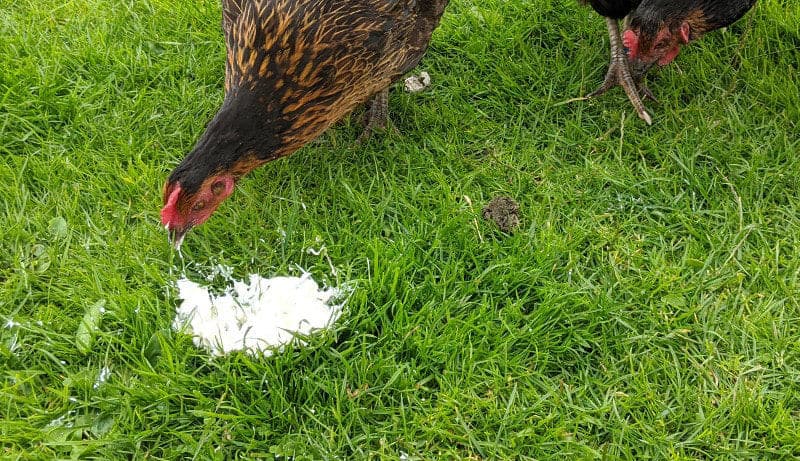
In a moment, we’ll come to whether you should feed yogurt to chickens, but first, let’s think about whether it has any potential benefits for them.
Yogurt contains many important nutrients, although the precise nutritional profile of yogurt varies greatly, depending on which type of yogurt you’re talking about.
As an example, unsweetened strained (i.e. Greek-style) yogurt typically consists of carbohydrates, proteins and fat. It is a good source of riboflavin (vitamin B2) and vitamin B12 while also containing small amounts of all the other B vitamins.
It is a rich source of phosphorous and also contains a good amount of calcium, something that chickens require to lay healthy eggs with strong shells among other things. Several other minerals are also present.
Many of these nutrients are vital to chicken health, so on the surface, yogurt would seem to have some benefits for chickens.
Probiotic yogurt also has living “friendly” bacteria introduced to it, which can help balance the gut microbiota of humans.
However, while there is some overlap between humans and chickens, it’s no surprise that the friendly bacteria that inhabit the guts of chickens differ from those found in humans.
As a result, the probiotic properties of yogurts intended for human consumption are far less beneficial to chickens, and there are more effective ways of improving the balance of gut microbiota in poultry.
Why is yogurt bad for chickens?
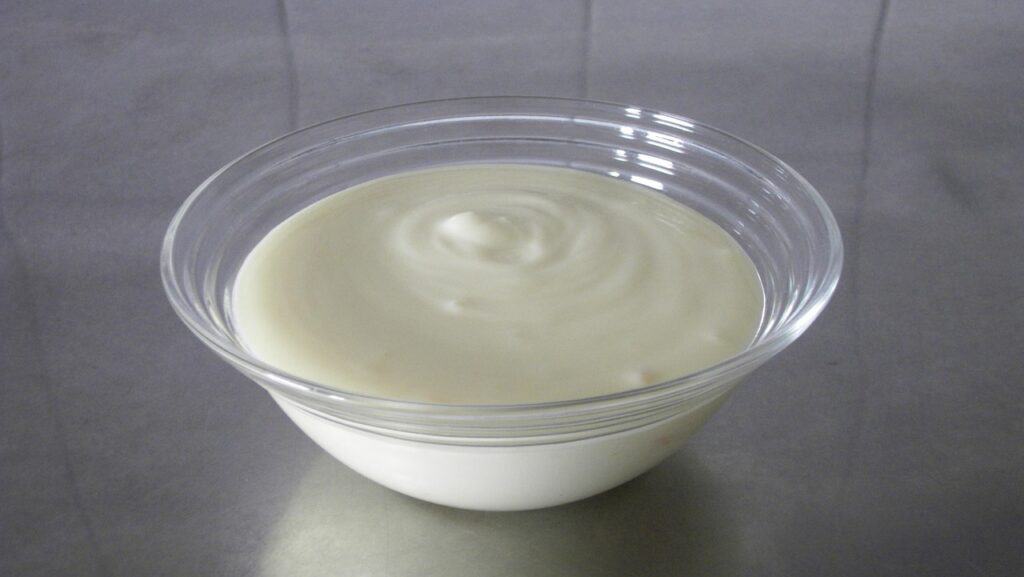
Although yogurt may contain many valuable nutrients that chickens need to thrive, there is one major problem that makes yogurt a less attractive option as a dietary supplement for your flock – and that’s the presence of lactose.
In humans, the ability to process lactose varies, but in areas where dairy farming has been practiced for a long time – on the scale of thousands of years – lactose tolerance tends to be high.
Lactose tolerance is related to the body’s ability to produce lactase, an enzyme that allows us to break the lactose in milk down into glucose and galactose.
People whose bodies produce little or no lactase are lactose intolerant to varying degrees, and the consumption of milk or dairy products can lead to abdominal pain, bloating, diarrhea, flatulence and nausea.
Chickens are also unable to produce lactase, and although the term isn’t usually applied to chickens, they are essentially lactose intolerant.
This means that consuming too much of any dairy product can also produce uncomfortable symptoms in chickens, so even though yogurt may contain valuable nutrients for them, it can be difficult for them to consume enough of it to benefit from these nutrients.
Furthermore, even if a chicken managed to consume larger amounts of yogurt, this could also lead to other health complications such as obesity due to the fat content, so feeding anything more than just a little yogurt to a chicken should be seen as being detrimental to their health.
Which types can chickens eat?
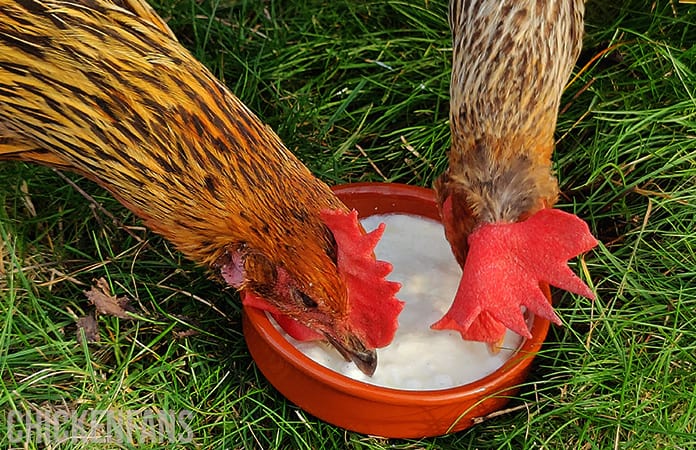
If you still want to feed yogurt to your chickens, some varieties are better than others.
The best sort is strained Greek-style yogurt. This is because the straining process that removes the whey also reduces the lactose content of the yogurt, making it easier for them to digest.
This means that they will be able to benefit more from the nutrients contained in the yogurt while suffering less from the symptoms of lactose intolerance.
When feeding Greek-style yogurt to chickens, you should nevertheless make sure it is unsweetened and unflavored, since sugar or flavorings will make it less healthy for your birds.
Probiotic yogurt is marginally better than pasteurized – but as we’ve mentioned, the gut microbiota of a chicken is different from ours, so the benefits are greatly reduced.
However, even when feeding them non-strained yogurt, it should always be plain and unsweetened – for the same reasons as with Greek-style yogurt.
Should you feed yogurts to chickens?
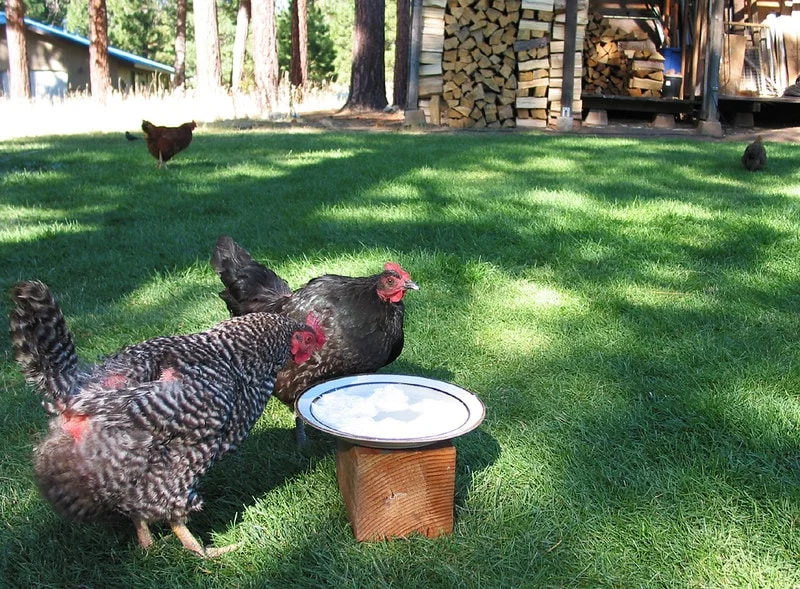
So we’ve established that you can feed yogurt to chickens in small quantities if you want to, but perhaps the more important question is should you? So let’s summarize.
Yogurt contains many nutrients that chickens need. However, due to their inability to break down lactose, the amount they can get from yogurt is limited since feeding them too much yogurt will make them sick.
This is true, even of strained yogurt, despite the reduced lactose content.
This means that while many of the nutrients chickens need are found in yogurt, there are far better and healthier ways to give your birds these nutrients that won’t potentially make them sick or lead to long-term health issues.
Our advice is to avoid feeding yogurt to chickens and to favor other more chicken-friendly foods instead. A chicken’s digestive system simply isn’t set up to deal with dairy, so give them something that’s more suited to their digestive systems.
That said, if you absolutely must feed yogurt to your chickens – and they seem to enjoy eating it as a change from their regular diet – you can probably feed them a little from time to time without them suffering any ill effects.
How can you feed yogurt to chickens?
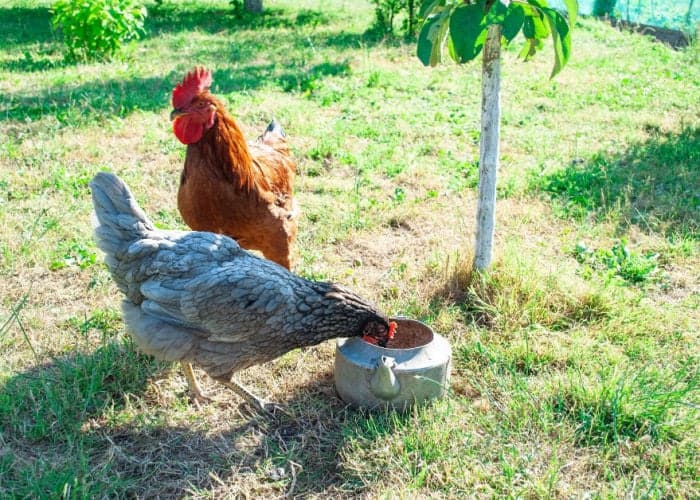
If, against our advice, you’ve decided to share a bit of your Greek yogurt with your birds, how should you go about doing it?
The best option is probably simply to put a little yogurt in a heavy bowl and leave it in their run to see if they’re interested. You may find they just ignore it, but a few of your chickens may enjoy it.
Another idea is to mix in a few pieces of fruit that are more beneficial – and interesting – to chickens. That way, they’ll also benefit from the nutrients contained in the fruits, giving their health an extra boost.
Alternatively, in the summer, you might like to try freezing some cubes of yogurt and leaving them for your birds to peck at as a way of helping them keep them cool.
Can you feed yogurt to chicks?
While adult chickens might be able to deal with a little yogurt from time to time, chicks are another matter. They won’t benefit from yogurt and even a small amount can make them ill, so we advise against giving yogurts to chicks in any circumstances.
Stick to food intended for chicks and you can’t go wrong.
Feed in moderation – if at all
The main takeaway from all this should be that you can feed chickens a little yogurt, but it should be given to them in extreme moderation – if at all.
One small cup of yogurt between two or three birds once a week could be ok, but any more than this would be too much.
Chickens can be given up to 10% of their overall diet in the form of treats, with the rest coming from their regular formulate feed.
However, yogurt shouldn’t make up anything like 10% of what they eat – but in much smaller quantities, it shouldn’t do them any harm.
Chickens can eat yogurt if they must
As you should have realized by now, chickens can eat yogurt if you have decided they absolutely must, but there are far better options to give them that are much better suited to their digestive systems, so there’s no real reason why they should be eating it.
However, if you do want to feed chickens yogurt, make sure you don’t give them too much – and that way, you can safely avoid them suffering from any yogurt-related illnesses.




